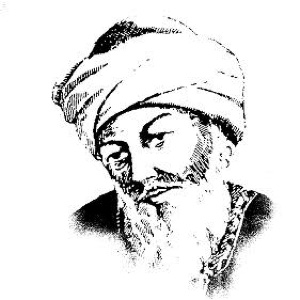
Hakim Sanai (circa 1080 – 1141) was a Persian poet from Ghazni who lived between the 11th century and the 12th centuries in ancient Iran, what is now Afghanistan. He wrote an enormous quantity of mystical verse, of which The Walled Garden of Truth is his master work and the first Persian mystical epic of Sufism. The work expresses the poet’s ideas on God, love, philosophy and reason. For close to 900 years The Walled Garden of Truth has been consistently read as a classic and employed as a Sufi textbook. Sanai’s poetry had a tremendous influence upon Persian literature.

Quotations by Hakim Sanai…
He always knows what is in men’s minds; you would do well to reflect on this. Love’s conqueror is he whom love conquers.
While reason is still tracking down the secret, you end your quest on the open field of love.
When you sincerely enter into prayer, you will come forth with all your prayers answered. But a hundred prayers that lack sincerity will leave you still the bungler that you are, your work a failure. Prayers said from habit are like the dust that scatters in the wind. The prayers that reach God’s court are uttered by the soul.
Bring all of yourself to his door. Bring only a part, and you’ve brought nothing at all.
Love’s conqueror is he whom love conquers.
No tongue can tell Your secret
For the measure of the word obscures Your nature
But the gift of the ear
Is that it hears
What the tongue cannot tell.
It is useless quibbling over a mere word, even if that word is God. To accept or reject it, when we have no knowledge of what it may represent, is equally inappropriate. God is a mystery, and the mystery remains, whatever name we give to it.
Hakim Sanai (circa 1080 – 1141), from The Walled Garden of Truth
The special form of friendship and love which grows between teacher and pupil is simultaneously a bond of friendship between man and God. Such a process is the very reverse of hero-worship. The teacher systematically and very effectively rejects those manifestations from his charges which have their origins in the self. Pupils are weaned at the outset from the tendency to fixate and identify with authority figures. If this first lesson is not learnt, there are no others. The teacher is merely a channel of communication. His presence may elicit love and devotion from those around him, but these are destined not for himself but for the reality his teaching represents.
Hakim Sanai (circa 1080 – 1141), from The Walled Garden of Truth
